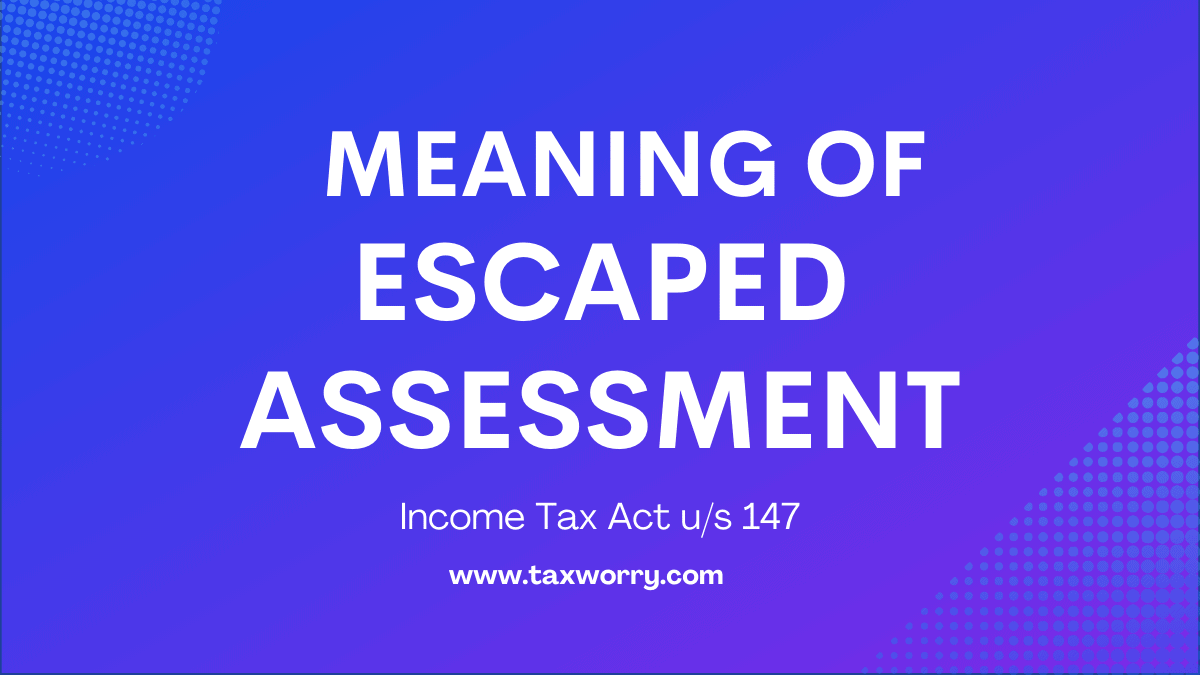Meaning of tax terms
Meaning of “Escaped Assessment”
The meaning of escaped assessment under section 147 of the Income Tax Act is not defined in the act itself. But we can take guidance from decisions by various high courts. Here are excerpts of courts orders in which the Hon’ble High Court tried to explain the meaning of escaped assessment.

Meaning of escaped assessment defined by court
The phrase ‘escaped assessment’ used in section 147 of the Income Tax Act came up before various high courts as detailed under :
1. Hon’ble supreme court explained the meaning of ‘escaped assessment’ while delivering judgment in CIT vs. Sun Engineering Works (P.) Ltd. [1992] 198 ITR 297 (SC) as under :
Meaning : The use of the expression ‘assess or reassess such income or recompute the loss or depreciation allowance’ in section 147 after the conditions for reassessment are satisfied is only relatable to the preceding expression in clauses (a) and (b), viz., ‘Escaped assessment’. The term ‘escaped assessment’ includes both ‘non-assessment’ as well as ‘underassessment’.
Income is said to have ‘escaped assessment’ within the meaning of this section when it has not been charged in the hands of an assessee in the relevant year of assessment. The expression ‘assess’ refers to a situation where the assessment of the assessee for a particular year is, for the first time, made by resorting to the provisions of section 147 because the assessment had not been made in a regular manner under the act.
The expression ‘reassess’ refers to a situation where an assessment has already been made but the income-tax officer has, on the basis of information in his possession, reason to believe that there has been under- assessment on account of the existence of any of the grounds contemplated by the provisions of section 147(b) read with the explanation 1 thereto.
2. Hon’ble supreme court explained the meaning of ‘escaped assessment’ while delivering judgment in Maharaj Kumar Kamal Singh Vs. CIT[1959] 35 ITR 1 (SC) as under :
Meaning : Escape’ in section 34(1)(b) of the 1922 act was not confined to cases where no return had been submitted by the assessee or where income had not been assessed owing to inadvertence or oversight or other lacuna attributable to the assessing authorities; even in case where a return had been submitted, if the ito had erroneously failed to tax a part of the assessable income, it was a case where that part of the income had escaped assessment.
3. Hon’ble Kolkata High Court explained the meaning of ‘escaped assessment’ while delivering judgment in Hum Boldt Wedag India Ltd. Vs. ACIT 1997 tax lr 786 (Cal.) as under :
Meaning : The expression ‘escaped assessment’ clearly connotes a very basic postulate that the income for a particular assessment year went unnoticed by the assessing officer and because of it not being noticed by him for any reason, it escaped assessment. The meaning of the expression ‘escaped assessment’ is so simple and straight that it does not leave anyone in doubt that power under section 147 of the act could be invoked by the assessing officer if it is a case of escapement of assessment of income for a particular year.
4. Hon’ble Gujarat High Court explained the meaning of ‘escaped assessment’ while delivering judgment in Praful Chunilal Patel Vs. M.J. Makwana, ACIT [1998] 148 CTR (Guj.) 62 as under :
Meaning : The words ‘escaped assessment’ where the return is filed, are apt to cover the case of discovery of a mistake in the assessment caused by either an erroneous construction of the transaction or due to its non-consideration or caused by a mistake of law applicable to such transfer or transaction even where there has been a complete disclosure of all relevant facts upon which a correct assessment could have been based.
5. Hon’ble ITAT-Ahmedabad explained the meaning of ‘escaped assessment’ while delivering judgment in ITO Vs. Saurashtra Cement & Chemical [1986] 18 ITD 414 (Ahd. – Trib.) as under :
Section : 148
Meaning : Since the expression ‘escaped assessment’ is defined in explanation 1 to section 147, the said expression will have to be given the same meaning while construing the provisions of section 149.The expression ‘escaped assessment’ would also include income assessed at too low a rate, while construing the provisions of section 149.
Section 147 of Income Tax Act
Income escaping assessment.
147. If any income chargeable to tax, in the case of an assessee, has escaped assessment for any assessment year, the Assessing Officer may, subject to the provisions of sections 148 to 153, assess or reassess such income or recompute the loss or the depreciation allowance or any other allowance or deduction for such assessment year (hereafter in this section and in sections 148 to 153 referred to as the relevant assessment year).
Explanation.—For the purpose of assessment or reassessment or recomputation under this section, the Assessing Officer may assess or reassess the income in respect of any issue, which has escaped assessment, and such issue comes to his notice subsequently in the course of the proceedings under this section, irrespective of the fact that the provisions of section 148A have not been complied with.
In this article, you can get guidance from high courts on the meaning of escaped assessment under section 147 of the Income Tax Act.
Updated up to Finance Act 2021
